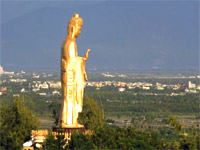Fo Guang Shan reaches out to Brazil
By Stan Lehman, ASSOCIATED PRESS, April 8, 2005
Cotia, Brazil -- As the Buddhist monastery's sweeping red roof comes into view above the rolling green hills, a visitor can imagine its chambers filled with robed monks meditating and chanting.
 Instead, the sprawling monastery and temple is home to just 14 young Brazilians studying to become Fo Guang Shan monks or nuns in this city about 20 miles west of Sao Paulo, Brazil's biggest city.
Instead, the sprawling monastery and temple is home to just 14 young Brazilians studying to become Fo Guang Shan monks or nuns in this city about 20 miles west of Sao Paulo, Brazil's biggest city.
"We have planted a seed for the future growth of Humanist Buddhism in Brazil," said Chueh Cheng, abbess of the Zu Lai monastery. "It is a slow and gradual process that will require a lot of patience because we do not proselytize."
Still, Chueh - who is known by the nickname Sinceridade, Portuguese for sincerity - says the monastery is the cornerstone of a plan to help Buddhism grow in the world's largest Roman Catholic country.
Fo Guang Shan, or Mountain of Buddha's Light, is a Chinese school of Humanist Buddhism that encourages its followers "to incorporate into our day-to-day lives the teachings of Buddha about generosity, compassion and happiness, not only for our own benefit but for the benefit of all those around us," explains Cheuh.
In other words, unlike the more introspective transcendental Buddhism, the Humanists set an example with their good works and concern for the interests, needs and welfare of society as a whole.
"In 50 years, there will be at least 2 million practicing Buddhists in this country," Chueh predicted.
It's an ambitious goal, considering that today just 214,873 people in Brazil call themselves practicing Buddhists. Some 125 million of Brazil's 183 million people are Catholics, according to the 2000 census.
Another 26 million or so Brazilians are evangelical Protestants. Aggressive proselytizing by the Pentecostal sects has made Protestantism the country's fastest growing religious sector.
Moacir Mazzariol Soares, one of Chueh's aides, says the census underestimates the number of Buddhists. "What the census does not show is the number of people who follow and practice Buddhist philosophy and tenets, without abandoning the religions they were born into," Soares said.
Andre Porto, a coordinator at Rio de Janeiro's Institute for Religious Studies, agrees.
"There is definitely a swelling tide of interest" in Buddhism, Porto said. "A growing number of Brazilians are seeking some form of spirituality but reject the dogmas or God of the Judeo-Christian tradition."
It was this kind of spiritual quest that led Joao Paulo Vito to turn to Buddhism and enter the monastery last year to become a monk.
"Here I found the spirituality I was looking for," the 21-year-old Vito said. "I also think that Buddhism is the best path to take to help my country, the world and mankind."
"I want to work with street children and others who have lost their way in this chaotic world and help them find a purpose to their lives," he added.
Fo Guang Shan is not the only school of Buddhism in Brazil, but it has the best chance of growing and taking root in Brazil, according to Frank Usarski, a religious studies professor at Sao Paulo's Catholic University.
"Fo Guang Shan is one of the biggest and definitely the most dynamic schools of Buddhism," Usarski explained in an interview. "It is in constant expansion."
"In Brazil, where the number of Buddhists is very small, the monastery and temple are part of a well-planned strategy to establish Fo Guang Shan's roots in this country."
Besides courses in meditation and Buddhist philosophy, the monastery offers classes in kung fu and tai chi chuan as a way to attract interest in the religion. It also sponsors outreach programs to help underprivileged children in a nearby shantytown.
"These programs are a way of exposing these children to Buddhism in the hopes that one day they will become devoted followers," Usarski added.
A program called "Filhos de Buda," or Buddha's Children, schools over 100 children in basic notions of ethics, meditation, English and computer studies.
"The program not only helps divulge Buddhism but also helps these children develop their full potential as human beings," Soares said.
Founded in 1967 by Master Hsing Yun, the Taiwanese-based Fo Guang Shan school has opened 200 temples around the world.
In 1992, it came to Brazil and inaugurated the Zu Lai temple in the Sao Paulo suburb of Cotia. In 2003, it opened the monastery, which Soares claims is the largest Buddhist monastery in Latin America.
The temple and monastery were built on land donated by a wealthy businessman from Sao Paulo's Chinese community. It's maintained, Soares said, by donations from "all over Brazil and the world."

 Instead, the sprawling monastery and temple is home to just 14 young Brazilians studying to become Fo Guang Shan monks or nuns in this city about 20 miles west of Sao Paulo, Brazil's biggest city.
Instead, the sprawling monastery and temple is home to just 14 young Brazilians studying to become Fo Guang Shan monks or nuns in this city about 20 miles west of Sao Paulo, Brazil's biggest city.